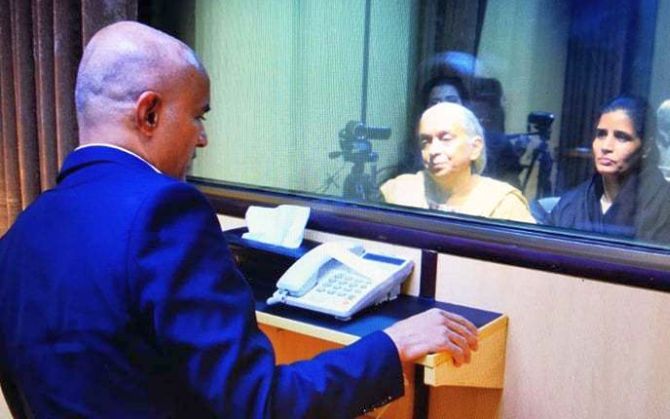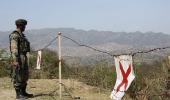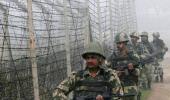'When Sushma Swaraj was campaigning like a one-man army against Pakistan for the treatment meted out to Chetna Jadhav and her mother-in-law, National Security Advisor Ajit Doval was secretly huddled with his Pakistani counterpart in Bangkok.'
'It is becoming impossible to make rational judgments about our government's Pakistan policies,' says Ambassador M K Bhadrakumar.

IMAGE: Kulbhushan Jadhav meets his mother Avanti and wife Chetna at Pakistan's foreign ministry in Islamabad, December 25, 2017. Photograph: Pakistan foreign office
There were moments last week when the high-octane media publicity over the visit by Chetna Jadhav, Kulbhushan Jadhav's wife, accompanied by her mother-in-law, to Islamabad was playing out, it seemed External Affairs Minister Sushma Swaraj was excessive, probably carried away by emotions of a kind that we usually do not associate with a country's top diplomat.
Today, there is an inchoate heaviness in the heart, while reading the 'breaking news' that all that while when Swaraj was campaigning like a one-man army against Pakistan for the treatment meted out to Chetna Jadhav and her mother-in-law, India's National Security Advisor Ajit Doval was secretly huddled with his Pakistani counterpart Lieutenant General Nasir Khan Janjua (retd) in the nearest watering hole in the region, Bangkok.
The Bangkok session was a 'pre-scheduled meeting' -- and substantive discussions, it seems -- and Swaraj apparently was aware of it.
The question that begs an answer was whether Swaraj was covering up for Doval in the domestic circus in a massive diversionary tactic.
The domestic audience feels utterly confused -- as if we live in an Orwellian animal farm -- because the Bangkok meeting took place hardly a fortnight after PM Modi alleged a Pakistani plot to hijack the electorate in Gujarat out of the BJP orbit -- and, in fact, coinciding with our 'surgical strike 2.0'.
It is becoming impossible to make rational judgments about our government's Pakistan policies.
Of course, Swaraj did splendidly well on the stage. But issues remain.
Any long time observer would vouchsafe that Pakistan did nothing extraordinary. Did the Indian side expect VIP treatment -- or even civil behaviour -- for Jadhav's relatives?
The really surprising part is that there was no physical violence. To put it mildly, both India and Pakistan are capable of bestial behaviour.
By their appalling standards, historically, Chetna and her mother-in-law were accorded a rather decent reception at the Pakistani foreign ministry.
Could South Block have handled things differently under the circumstances?
To my mind, a rare opportunity is lost to take Pakistan at its word -- in fact, Pakistan army chief General Qamar Javed Bajwa's unprecedented call recently to settle problems with India peacefully through negotiations.
Things were somewhat looking up for Jadhav's tragic life. I for one never thought that Pakistan would execute him (since they have nothing to gain out of the animal instinct of 'revenge'.)
Jadhav might even have been repatriated to India at some point in a conceivable future and left to live the rest of his life in his own country. These are days of the indeterminate sentence, after all.
At the very least, Chetna would have been given similar future opportunities to visit her husband. Alas, we have slammed the door shut on all those tantalising possibilities.
Chetna is the real loser here. She may never get to see her husband again even fleetingly for a few precious moments, even across a glass panel -- even without wearing her chappals.
Indeed, some very big questions arise here.
What do we do with cases like Jadhav?
What do we gain out of reducing human tragedies to the stuff of grandstanding?
We should not exploit the ignorance of Indian public opinion regarding the ways of the world in the 21st century. Informed debates are not possible when the government injects hyperbolic foreplay.
Compassion, to my mind, is what Jadhav ought to deserve. But instead we throw him to the vultures of Indian politics. Could it be that we don't want him to return? Civilised modern States respect even their spies.
I read recently a profoundly moving feature article in Sputnik about the legendary Soviet spy George Blake who turned 95 last month. Blake was no ordinary spy. He was a traitor with a capital 'T' to his motherland Great Britain.
But even amidst the mutual paranoia of espionage, Blake was an extraordinary phenomenon. Plays were staged on the London theatre on Blake's life as a double agent, and films were made.
This was what the late British prime minister Harold Macmillan recorded in his diaries when Blake was caught by MI5 (betrayed by a Polish defector in 1961) and sentenced by a British court to 42 years imprisonment in Wormwood Scrubs prison (from where he had a daring escape and made his way to Moscow, across Europe, crossing the Berlin Wall in a wooden box attached to the undercarriage of a car):
'Blake asserted he had yielded to no material pressure or advantages but had been genuinely converted to Communism while a prisoner of war in Korea. With an ideological spy, we were faced with a phenomenon such as had hardly appeared in these islands for some four hundred years.'
Ten years ago, on Blake's 85th birth anniversary, Russian President Vladimir Putin awarded him the Order of Friendship. On the eve of his birthday in November, Russian authorities accorded Blake the high honour of addressing the officers of the Russian Intelligence Service to share memories of his eventful life and times -- and his beliefs and faith that prompted him to work for the Soviet Union.
'95 years. It is too much for a single person. And too little in the life span of humankind.' Blake concluded. 'The memories of my past which repeatedly said I do not regret not in the least give me strength to look to the future with optimism.'











 © 2025
© 2025